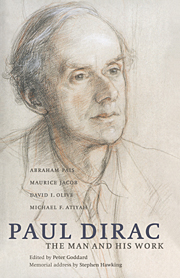3 - The monopole
Published online by Cambridge University Press: 06 October 2009
Summary
It is a great privilege to speak to you on this occasion in which we commemorate Paul Dirac. In common with many of my friends in the audience, I enjoyed the good fortune of hearing the lectures on quantum mechanics delivered by him in Cambridge. Actually I was doubly fortunate as, in my year, 1959–60, he added a second course, extending beyond the material in his famous book.
Not only did we learn quantum mechanics as never before, but, very gently, we were shown a standard of logical presentation and clarity, indeed an aesthetic of logic, that was unforgettable. I believe I can say that this experience has affected many of us deeply and provided us with an ideal to which we struggle to aspire in our own research and teaching.
In Dirac's hands the beauty of mathematical logic and rational argument was not merely a tool for establishing sound proofs. Rather it could be a weapon of discovery that could lead to the most unexpected yet perfectly valid conclusions, which, once understood and assimilated, were unassailable in their beauty and Tightness. The importance of this is that it is the discovery of the unexpected truth that changes the direction of scientific development, in both theoretical and experimental work. Dirac repeatedly showed how implacable yet beautiful logic could achieve these ends, as the other speakers also demonstrate.
- Type
- Chapter
- Information
- Paul DiracThe Man and his Work, pp. 88 - 107Publisher: Cambridge University PressPrint publication year: 1998



